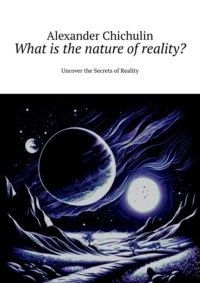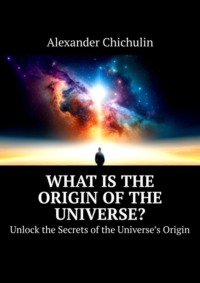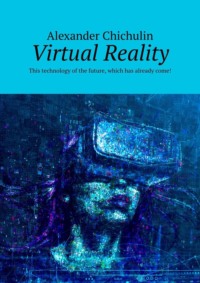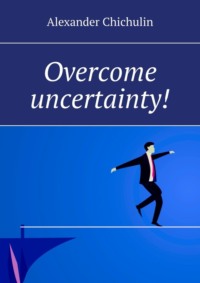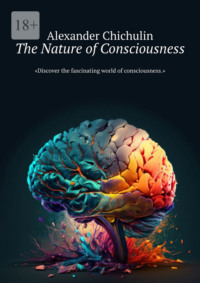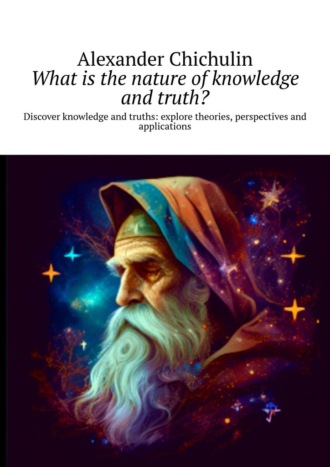
Полная версия
What is the nature of knowledge and truth? Discover knowledge and truths: explore theories, perspectives and applications

What is the nature of knowledge and truth?
Discover knowledge and truths: explore theories, perspectives and applications
Alexander Chichulin
© Alexander Chichulin, 2023
ISBN 978-5-0059-9913-9
Created with Ridero smart publishing system
1. Introduction: Defining Knowledge and Truth
In our everyday lives, we often rely on the concepts of knowledge and truth to make sense of the world around us. We seek to acquire knowledge through our experiences, observations, and interactions with others, and we use this knowledge to inform our beliefs and actions. At the same time, we value truth as a standard of accuracy and reliability, striving to ensure that our beliefs and actions are consistent with the facts of reality.
But what exactly do we mean by knowledge and truth, and how do we come to know what we know? These are fundamental questions that have been explored by philosophers and scholars throughout history, and they continue to be the subject of ongoing debate and inquiry. In this book, we will explore different perspectives on the nature of knowledge and truth, examining the ways in which they are defined, acquired, and applied in various contexts.
By delving into these topics, we will gain a deeper understanding of how we come to know what we know, how we determine what is true, and how these concepts shape our perceptions of the world. We will also explore the implications of these concepts for fields such as science, ethics, and society at large. Ultimately, our goal is to develop a richer and more nuanced understanding of the nature of knowledge and truth, and to consider how we might use this knowledge to enhance our lives and the world around us.
– What do we mean by knowledge and truth?
Knowledge refers to information that we possess or have access to, that we believe to be true and can be justified with reasons or evidence. It involves the ability to understand, recognize, and recall information, as well as the capacity to apply that information in different contexts. Knowledge can be gained through various means such as personal experience, education, observation, reasoning, and communication with others.
Truth, on the other hand, refers to the state or quality of being in accordance with fact or reality. It is often associated with ideas, beliefs, or propositions that correspond to the way things actually are, as opposed to being false or misleading. Truth can be objective, meaning that it exists independently of human opinions or beliefs, or it can be subjective, meaning that it depends on individual perspectives or experiences.
In general, knowledge and truth are interconnected concepts that inform one another. Our knowledge can be said to be true when it corresponds to reality or when it is justified by sound evidence or reasoning. Conversely, our understanding of truth can be shaped and informed by the knowledge that we possess.
– Why are these concepts important to explore?
The concepts of knowledge and truth are important to explore for a number of reasons. Firstly, they are fundamental to our understanding of the world around us, and they play a crucial role in shaping our beliefs, attitudes, and actions. By exploring these concepts, we can gain a deeper understanding of how we come to know what we know, how we determine what is true, and how these concepts influence our perceptions of reality.
Secondly, knowledge and truth are key components of many academic disciplines, including philosophy, science, and ethics. These fields rely on the concepts of knowledge and truth to guide their inquiries and to evaluate the validity of their findings. By exploring these concepts, we can gain a better understanding of how different fields approach the questions of knowledge and truth, and how these approaches might inform one another.
Finally, the concepts of knowledge and truth are highly relevant to contemporary issues in society, such as fake news, misinformation, and the rise of conspiracy theories. By exploring these concepts, we can gain insights into the challenges that arise when people hold false or misguided beliefs, and we can develop strategies for promoting more accurate and reliable knowledge and truth claims.
Overall, exploring the concepts of knowledge and truth is important because it can help us develop a more nuanced and sophisticated understanding of the world around us, and it can inform our beliefs, attitudes, and actions in meaningful ways.
2. Theories of Knowledge
In this chapter, we will explore different theories of knowledge, including rationalism, empiricism, innatism, and the role of intuition and experience.
Rationalism holds that knowledge can be acquired through reason and intuition, independent of sensory experience. Rationalists believe that there are innate ideas or concepts that we are born with, and that these ideas form the foundation of our knowledge. Examples of rationalist thinkers include Descartes, Leibniz, and Spinoza.
Empiricism, on the other hand, holds that knowledge comes primarily from sensory experience. Empiricists believe that all knowledge is derived from observation and experimentation, and that our minds are essentially blank slates or tabula rasa at birth. Examples of empiricist thinkers include Locke, Hume, and Mill.
Innatism is a theory of knowledge that falls somewhere in between rationalism and empiricism. It holds that some knowledge is innate, but that this knowledge is not fully formed at birth and must be developed through experience. Innatists believe that the mind has certain structures or faculties that allow us to acquire knowledge, but that these structures are not fully activated until we have experiences in the world. Examples of innatist thinkers include Plato, Kant, and Chomsky.
The role of intuition and experience is another important aspect of theories of knowledge. Some philosophers believe that intuition plays a critical role in our acquisition of knowledge, allowing us to grasp fundamental truths or principles without needing to reason them out. Others believe that experience is the primary way that we gain knowledge, and that intuition is not a reliable source of knowledge.
By exploring these different theories of knowledge, we can gain a better understanding of the ways in which we come to know what we know, and how different philosophical perspectives have approached this question throughout history.
– Rationalism vs. Empiricism
Rationalism and empiricism are two major theories of knowledge that have been debated by philosophers for centuries. In this chapter, we will focus on the differences between these two approaches to knowledge.
Rationalism holds that knowledge can be acquired through reason and intuition, independent of sensory experience. Rationalists believe that there are innate ideas or concepts that we are born with, and that these ideas form the foundation of our knowledge. They argue that these innate ideas are not derived from the senses, but are instead independent of them. For example, a rationalist might argue that the concept of justice is something that we are born with, and that we can reason about justice without needing to observe it in the world.
Empiricism, on the other hand, holds that knowledge comes primarily from sensory experience. Empiricists believe that all knowledge is derived from observation and experimentation, and that our minds are essentially blank slates or tabula rasa at birth. They argue that we have no innate ideas or concepts, and that all of our knowledge is derived from sensory experience. For example, an empiricist might argue that our concept of justice is derived from our experiences of observing just actions and injustice in the world.
The debate between rationalism and empiricism centers around the question of whether reason or experience is the primary source of knowledge. Rationalists argue that reason is more reliable than experience because it allows us to access universal truths that are not contingent on specific experiences. Empiricists, on the other hand, argue that experience is more reliable because it allows us to test our beliefs against the world and to revise them in light of new evidence.
Overall, the debate between rationalism and empiricism has been one of the central questions in epistemology, the study of knowledge. While there is no clear consensus on which approach is superior, many philosophers today see value in both rationalism and empiricism and seek to integrate the insights of both approaches into their theories of knowledge.
– Innatism vs. Tabula Rasa
Innatism and tabula rasa are two theories of knowledge that focus on the question of whether humans are born with innate knowledge or whether the mind is a blank slate at birth. In this chapter, we will explore the differences between these two approaches.
Innatism is the theory that some knowledge is innate, meaning that it is present in the mind from birth. Innatists argue that the mind has certain structures or faculties that allow us to acquire knowledge, and that these structures are already present in the mind before we have any experiences in the world. Innatists believe that these innate structures provide the foundation for our later knowledge acquisition. For example, an innatist might argue that humans have an innate capacity for language, and that this capacity is activated when we are exposed to language in our environment.
Tabula rasa, on the other hand, is the theory that the mind is a blank slate at birth, meaning that we have no innate knowledge or concepts. Tabula rasa theorists argue that all knowledge is acquired through experience, and that the mind is shaped entirely by our interactions with the environment. For example, a tabula rasa theorist might argue that our capacity for language is entirely dependent on exposure to language in our environment, and that we do not have any innate capacity for language.
The debate between innatism and tabula rasa centers around the question of whether there are any innate structures or faculties that guide our acquisition of knowledge. Innatists argue that there are certain innate capacities that allow us to learn more easily and effectively, while tabula rasa theorists argue that all knowledge is acquired through experience alone.
Overall, the debate between innatism and tabula rasa is important because it speaks to questions about the nature of human cognition and the role that nature and nurture play in our development. While there is no clear consensus on which theory is correct, many modern theories of knowledge and human development incorporate elements of both innatism and tabula rasa.
– The Role of Intuition and Experience
In this chapter, we will explore the role of intuition and experience in the acquisition of knowledge and truth. Intuition and experience are two important factors that shape our understanding of the world, and they are often invoked in philosophical debates about knowledge and truth.
Intuition is the ability to understand or know something immediately, without the need for conscious reasoning. Intuition is often described as a «gut feeling» or a sense of knowing that is not based on evidence or logical deduction. Intuition can be seen as a form of innate knowledge, as it is not necessarily learned through experience.
Experience, on the other hand, is the accumulation of knowledge and understanding through interaction with the world. Experience can take many forms, including sensory experience, introspection, and social interaction. Experience can be seen as a way of acquiring knowledge through observation, experimentation, and reflection.
The role of intuition and experience in the acquisition of knowledge and truth is a central question in epistemology, the study of knowledge. Some philosophers argue that intuition plays a fundamental role in acquiring knowledge, while others argue that knowledge can only be acquired through experience.
One example of the role of intuition in the acquisition of knowledge is the philosophical concept of «a priori» knowledge. A priori knowledge is knowledge that is independent of experience, and is often seen as a form of innate knowledge. Examples of a priori knowledge include mathematical truths and logical deductions.
Another example of the role of experience in the acquisition of knowledge is the scientific method. The scientific method relies on observation, experimentation, and analysis to develop knowledge and understanding of the natural world. Scientific knowledge is based on empirical evidence and is subject to revision based on new data and observations.
Overall, the role of intuition and experience in the acquisition of knowledge and truth is complex and multifaceted. While both intuition and experience play important roles in shaping our understanding of the world, their relative importance and relationship to each other remain topics of ongoing philosophical debate.
3. Theories of Truth
In this chapter, we will explore different theories of truth, which attempt to answer the question: what makes a statement or belief true?
One common theory of truth is the correspondence theory of truth. This theory states that a statement is true if it corresponds to reality. For example, the statement «the sky is blue» is true if, in fact, the sky is blue. The correspondence theory of truth emphasizes the importance of empirical evidence and observation in determining whether a statement is true.
Another theory of truth is the coherence theory of truth. This theory states that a statement is true if it coheres with other statements that we believe to be true. In other words, a statement is true if it fits into a coherent system of beliefs or knowledge. For example, if we believe that all mammals are warm-blooded and that dogs are mammals, then we would say that the statement «dogs are warm-blooded» is true because it coheres with our other beliefs.
A third theory of truth is the pragmatic theory of truth. This theory states that a statement is true if it is useful or practical to believe it. For example, if a doctor believes that a particular treatment will cure a patient, and that treatment does, in fact, cure the patient, then the doctor’s belief was true. The pragmatic theory of truth emphasizes the importance of practical outcomes and consequences in determining the truth of a statement.
There are also other theories of truth, such as the deflationary theory, which argues that the concept of truth is too simple to require a theory, and the consensus theory, which argues that truth is determined by social consensus or agreement.
Overall, the different theories of truth emphasize different aspects of what it means for a statement or belief to be true. While no single theory of truth has been universally accepted, understanding the different approaches to truth can help us better understand the nature of knowledge and how we come to know what we believe to be true.
Конец ознакомительного фрагмента.
Текст предоставлен ООО «ЛитРес».
Прочитайте эту книгу целиком, купив полную легальную версию на ЛитРес.
Безопасно оплатить книгу можно банковской картой Visa, MasterCard, Maestro, со счета мобильного телефона, с платежного терминала, в салоне МТС или Связной, через PayPal, WebMoney, Яндекс.Деньги, QIWI Кошелек, бонусными картами или другим удобным Вам способом.



